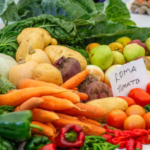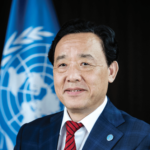… as hunger reaches alarming levels
Ntsoaki Motaung
The right to food encompasses ensuring that everyone has access to a diverse range of nutritious foods that contribute to a full, healthy, and dignified life, His Majesty King Letsie III stated during the recently concluded fourth annual World Food Forum (WFF) 2024 in Rome, Italy.
The King emphasised that this right fundamentally involves enabling healthy diets.
“Regrettably, we find ourselves in a situation where a staggering one-third of the world’s population cannot afford a healthy diet,” he noted, adding that this crisis demands immediate attention and action.
He pointed out that as the world reflects on the current state of food security, we must confront the harsh reality that globally, one in eleven people—and one in five in Africa—faced hunger in 2023.
His Majesty stressed that the issue extends beyond mere hunger.
“Without access to healthy diets and the realisation of the right to food, we face dire consequences. Children will suffer, and boys and girls will not reach their full potential. The health and well-being of women and men will be compromised, leading to deficiencies in many contexts and contributing to the growing epidemic of overweight and obesity worldwide,” he said.
However, he indicated that despite these challenges, the world has the power to reverse this trend. “We can transform our agrifood systems to enable everyone, everywhere, to enjoy healthy diets. This is our right to adequate food. Achieving good nutrition is not just an aspiration; it is an achievable goal that we must strive for collectively,” said King Letsie III.
According to the King, who also serves as the African Union (AU) Nutrition Champion, a well-nourished child is more likely to survive and thrive in their growth and development. This, in turn, contributes to their learning and employment outcomes, shaping the future for their families and communities, and ultimately driving the economic growth of nations.
“The importance of nutrition cannot be overstated; it is the foundation upon which the world can build a prosperous future,” he added.
The King’s remarks sharply contrast the submissions made to the High Court earlier this year by Prime Minister Ntsokoane Samuel Matekane, who argued that there is no right to food and that the government has no duty to provide food for its citizens.
“It is denied that there is a right to food. I further deny that the right to life is inclusive of emotional, intellectual, or spiritual needs. The right to life literally pertains to non-deprivation of one’s life, which may be deprived, as captured in Section 5 of the Constitution,” Matekane stated in an answering affidavit.
He was responding to a constitutional challenge initiated by the Christian Advocates and Ambassadors Association, which aims to compel the government to implement food subsidies following recent price increases for maize meal.
According to the United Nations (UN) Special Rapporteur on the right to food, people indeed have the right to food. The right to food is defined as the right to have regular, permanent, and unrestricted access—either directly or through financial means—to adequate and sufficient food that corresponds to cultural traditions and ensures a fulfilling and dignified life.
This definition aligns with General Comment No. 12 of the UN Committee on Economic, Social, and Cultural Rights, which states that “the right to adequate food is realized when every man, woman, and child, alone or in community with others, has physical and economic access at all times to adequate food or means for its procurement.”
The committee further emphasises that “the right to adequate food should not be interpreted in a narrow or restrictive sense equating it with a minimum package of calories, proteins, and other specific nutrients.”
“The right to adequate food will have to be realised progressively. However, States have a core obligation to take the necessary action to mitigate and alleviate hunger, even in times of natural or other disasters,” the Special Rapporteur explains. States have an obligation to fulfill (provide) the right directly when individuals or groups cannot, for reasons beyond their control, enjoy the right to adequate food.
This also applies to victims of natural or other disasters.
In his affidavit, Matekane denied that the lack of food poses a threat to life. “Life is not dependent only on food, as there are other contributory factors,” he said. “I vehemently deny that a person who has access to food leads a healthy life. One can have access to food and still live an unhealthy life,” he added.
Matekane also “vehemently” denied that the government has a duty to provide food for its people.
On 12 July 2024, he declared a state of National Food Insecurity Disaster after a historic drought, triggered by El Niño, led to the lowest crop yields since the 2018/19 agricultural season.
According to the government, about a third of the population—approximately 700,000 people—will face hunger in the coming months. In rural areas, more than 400,000 people are expected to experience crisis levels of acute hunger through March 2025.
Vulnerability assessments indicate that an additional 296,049 people are expected to become food insecure in urban areas. The drought has resulted in severe water shortages, with wells drying up.
Summary
- The right to food encompasses ensuring that everyone has access to a diverse range of nutritious foods that contribute to a full, healthy, and dignified life, His Majesty King Letsie III stated during the recently concluded fourth annual World Food Forum (WFF) 2024 in Rome, Italy.
- The right to food is defined as the right to have regular, permanent, and unrestricted access—either directly or through financial means—to adequate and sufficient food that corresponds to cultural traditions and ensures a fulfilling and dignified life.
- 12 of the UN Committee on Economic, Social, and Cultural Rights, which states that “the right to adequate food is realized when every man, woman, and child, alone or in community with others, has physical and economic access at all times to adequate food or means for its procurement.

Your Trusted Source for News and Insights in Lesotho!
At Newsday Media, we are passionate about delivering accurate, timely, and engaging news and multimedia content to our diverse audience. Founded with the vision of revolutionizing the media landscape in Lesotho, we have grown into a leading hybrid media company that blends traditional journalism with innovative digital platforms.









